Introduction
In the dynamic field of medical device trials, Contract Research Organizations (CROs) serve as essential facilitators, bridging the gap between manufacturers and regulatory authorities. Their multifaceted roles encompass managing clinical research projects, ensuring compliance with complex regulations, and optimizing trial efficiency. Colombia has emerged as a compelling location for these trials, thanks to its robust healthcare system, supportive regulatory framework, and cost-effective processes.
As the demand for innovative medical technologies grows, understanding the pivotal contributions of CROs and the advantages of conducting trials in Colombia becomes increasingly important for stakeholders aiming to navigate this intricate landscape successfully.
Understanding the Role of CROs in Medical Device Trials
Contract Research Organizations (CROs) play an essential role in the field of medical device studies, acting as intermediaries between device producers and oversight bodies. Their primary duties involve the thorough management of clinical research projects, which includes:
- Conducting feasibility studies
- Selecting suitable research sites and principal investigators (PIs)
- Ensuring compliance with local and international standards
- Overseeing meticulous project management
In a South American nation, CROs improve the research process by forming essential links with local healthcare providers and regulatory agencies, aiding in the obtainment of study approvals from ethics committees, INVIMA, and import permits from the Ministry of Industry and Commerce (MinCIT).
This streamlined approach not only boosts efficiency but also capitalizes on the competitive advantages of the country. Significantly, medical device studies in the country can save more than 30% compared to similar studies in North America or Western Europe. Additionally, the IRB/EC and MoH review process is notably swift, taking just 90-120 days. Furthermore, the country boasts a well-regarded healthcare system, recognized globally as one of the best.
Client testimonials reinforce these advantages, with insights from Dr. John B. Simpson, CEO of Avinger, Inc., and Bill Andrews, Ph.D., President & CEO of Sierra Sciences, highlighting their positive experiences and successful collaborations with LATAM CRO Experts. Their feedback highlights the importance of choosing this country for first-in-human studies, where the blend of cost effectiveness, approval speed, and high-quality healthcare establishes an ideal setting for research.
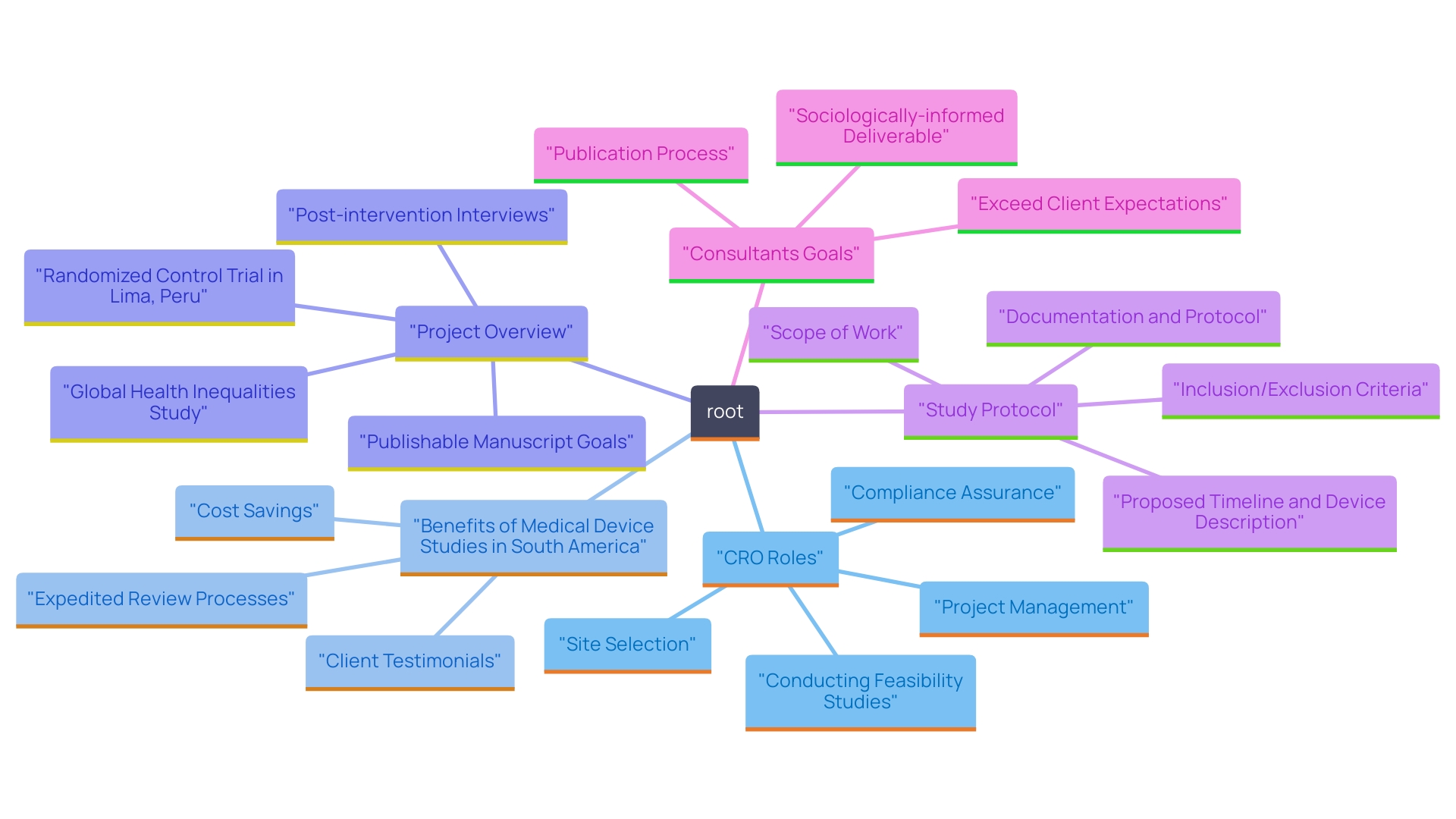
Why Colombia is an Ideal Location for Medical Device Trials
This country offers a multitude of benefits that establish it as an appealing location for medical device testing. The country's robust healthcare system, characterized by a blend of private and public services, offers access to diverse patient populations, which is crucial for the recruitment of study participants. Moreover, the regulatory landscape in the country is increasingly supportive of medical research, with streamlined processes facilitated by INVIMA, the National Food and Drug Surveillance Institute, ensuring efficient oversight and compliance for medical devices.
Bioaccess® offers extensive management services for studies, including:
- Feasibility assessments
- Site selection
- Compliance evaluations
- Setup
- Import permits
- Project oversight
- Reporting
The Colombian government has also established initiatives aimed at fostering innovation in medical technology, enhancing the market potential for new devices. For example, recent statistics indicate that clinical studies carried out in the country have risen by 30% over the past five years, greatly aiding in job creation and economic development. Furthermore, the cost-efficiency of carrying out studies in Colombia, in relation to other areas, offers a significant financial motivation for international backers aiming to enhance their research budgets. Bioaccess® has successfully conducted numerous studies, demonstrating a commitment to quality and compliance that positions it as a leader in the field.
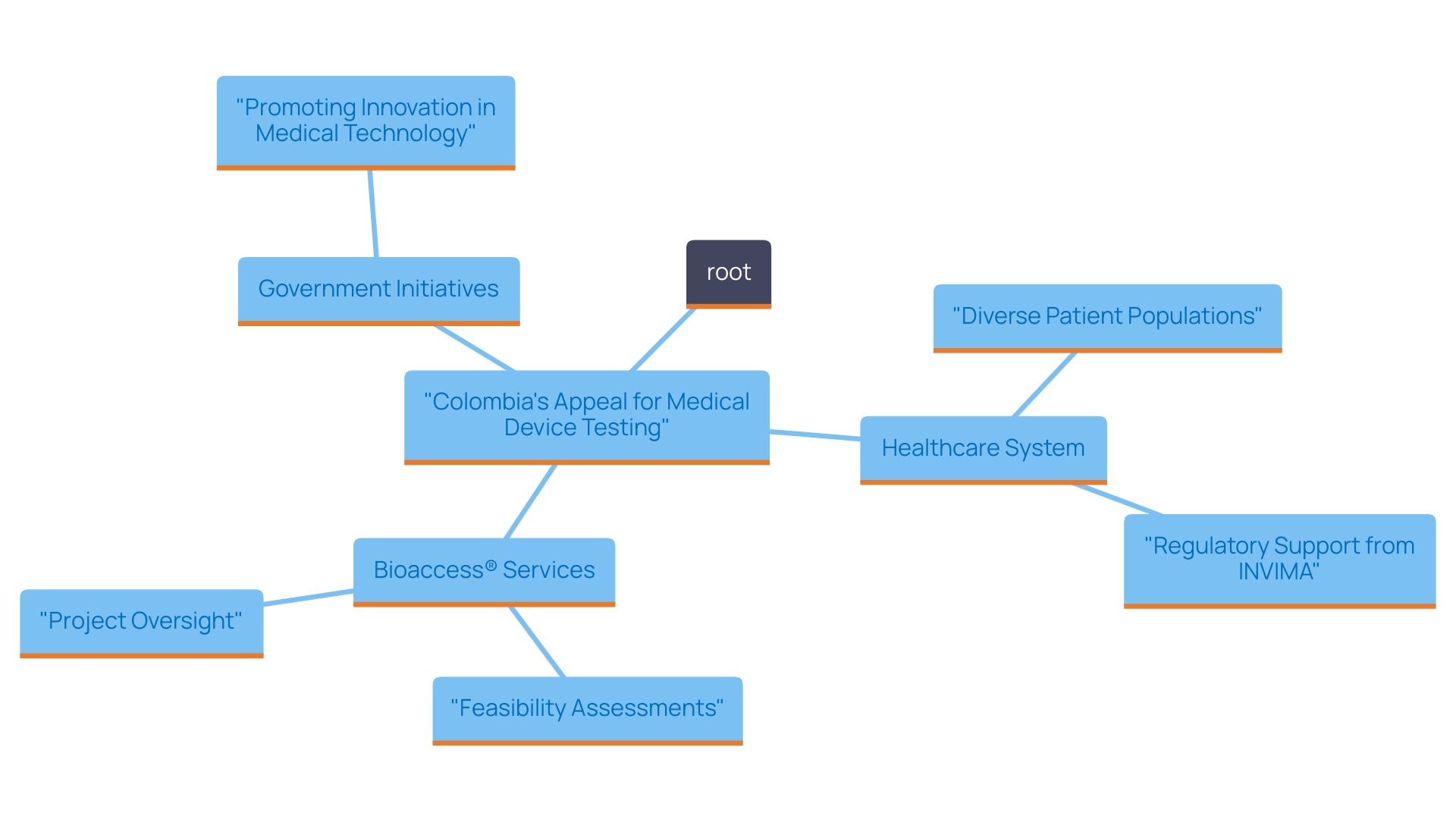
The Importance of Compliance and Quality Assurance
Adhering to local and international guidelines is essential in medical device testing. Contract Research Organizations (CROs) are responsible for ensuring that all elements of a study, from patient consent to data collection, conform to strict guidelines established by organizations such as the FDA and Colombia's oversight bodies, including INVIMA (Colombia National Food and Drug Surveillance Institute).
INVIMA plays a critical role in overseeing the marketing and manufacturing of health products, ensuring compliance with health standards, and providing medical approval for imports and exports. Quality assurance processes are essential to this compliance, involving regular audits and monitoring to identify and mitigate risks associated with clinical studies.
For instance, studies have shown that adherence to compliance standards can improve trial success rates by up to 30%. By prioritizing compliance, CROs not only protect participants but also enhance the credibility of the research findings, which is essential for gaining market approval and ensuring patient safety.
Katherine Ruiz, a specialist in compliance matters with extensive experience at INVIMA, exemplifies the knowledgeable guidance available for foreign manufacturers seeking market clearance in the nation, thereby underscoring the importance of understanding these frameworks.
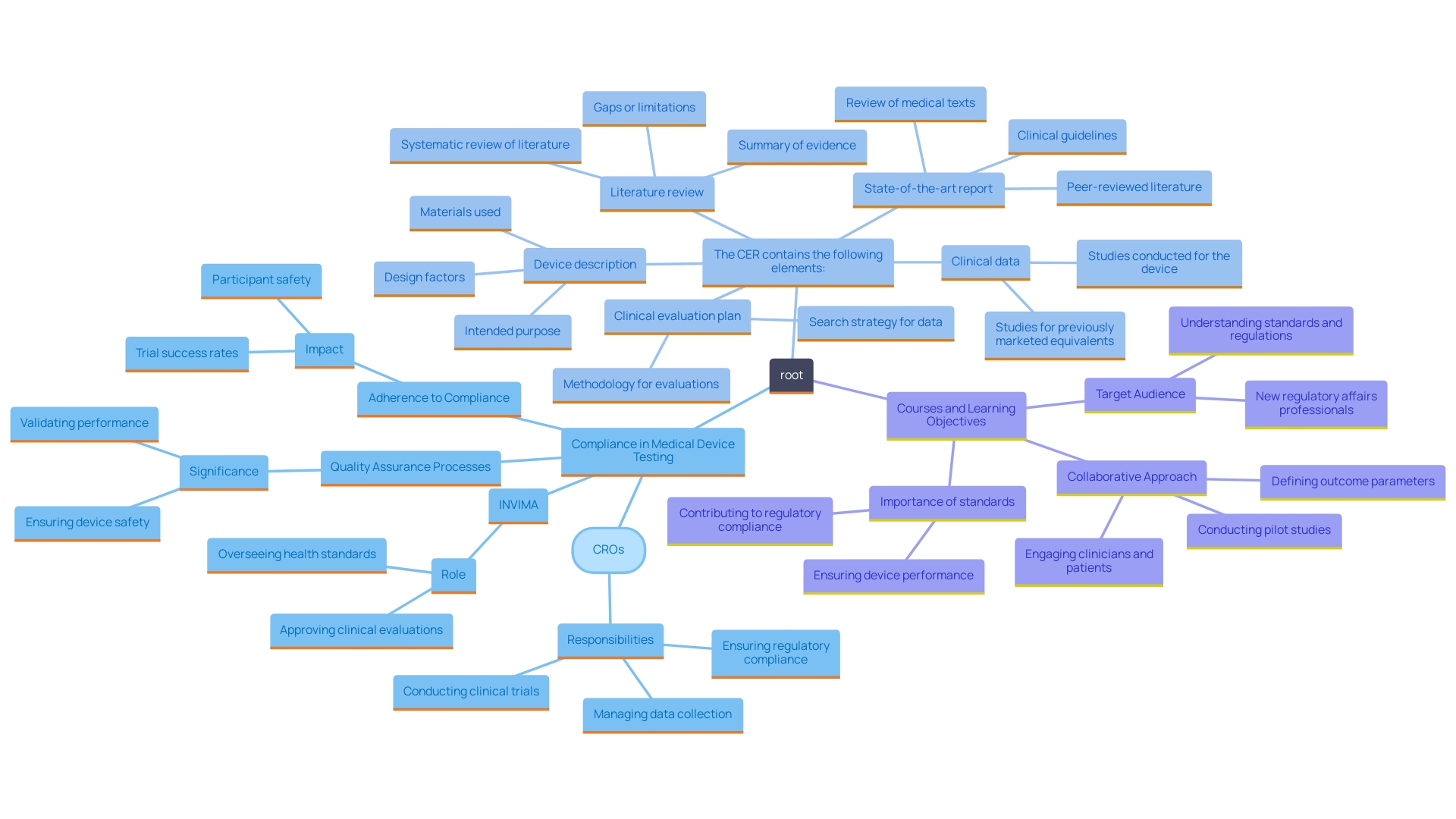
Collaborative Partnerships in Clinical Research
Successful medical research often arises from strong collaborative partnerships among various stakeholders, including device manufacturers, healthcare providers, regulatory bodies, and ethics committees. Recent collaborations, like the alliance between bioaccess™ and the Caribbean Health Group, seek to establish Barranquilla as a leading location for medical research in Latin America, supported by the backing of the nation's Minister of Health.
CROs like bioaccess™ are pivotal in facilitating these relationships, ensuring effective communication and coordination among all involved parties. For example, GlobalCare Clinical Studies has partnered with bioaccess™ to improve ambulatory services for research in Colombia, leading to more than a 50% decrease in recruitment time and a 95% retention rate.
By cultivating a cooperative atmosphere, CROs facilitate the sharing of resources, knowledge, and insights that promote innovation and efficiency in research studies. Additionally, these collaborations improve patient involvement and recruitment strategies, ultimately aiding the success of medical device studies.
bioaccess® also offers extensive trial management services, including:
- Feasibility studies
- Site selection
- Compliance reviews
- Trial setup
- Import permits
- Project management
- Reporting
The impact of these Medtech research studies on local economies is profound, leading to job creation, economic growth, improved healthcare, and increased international collaboration.
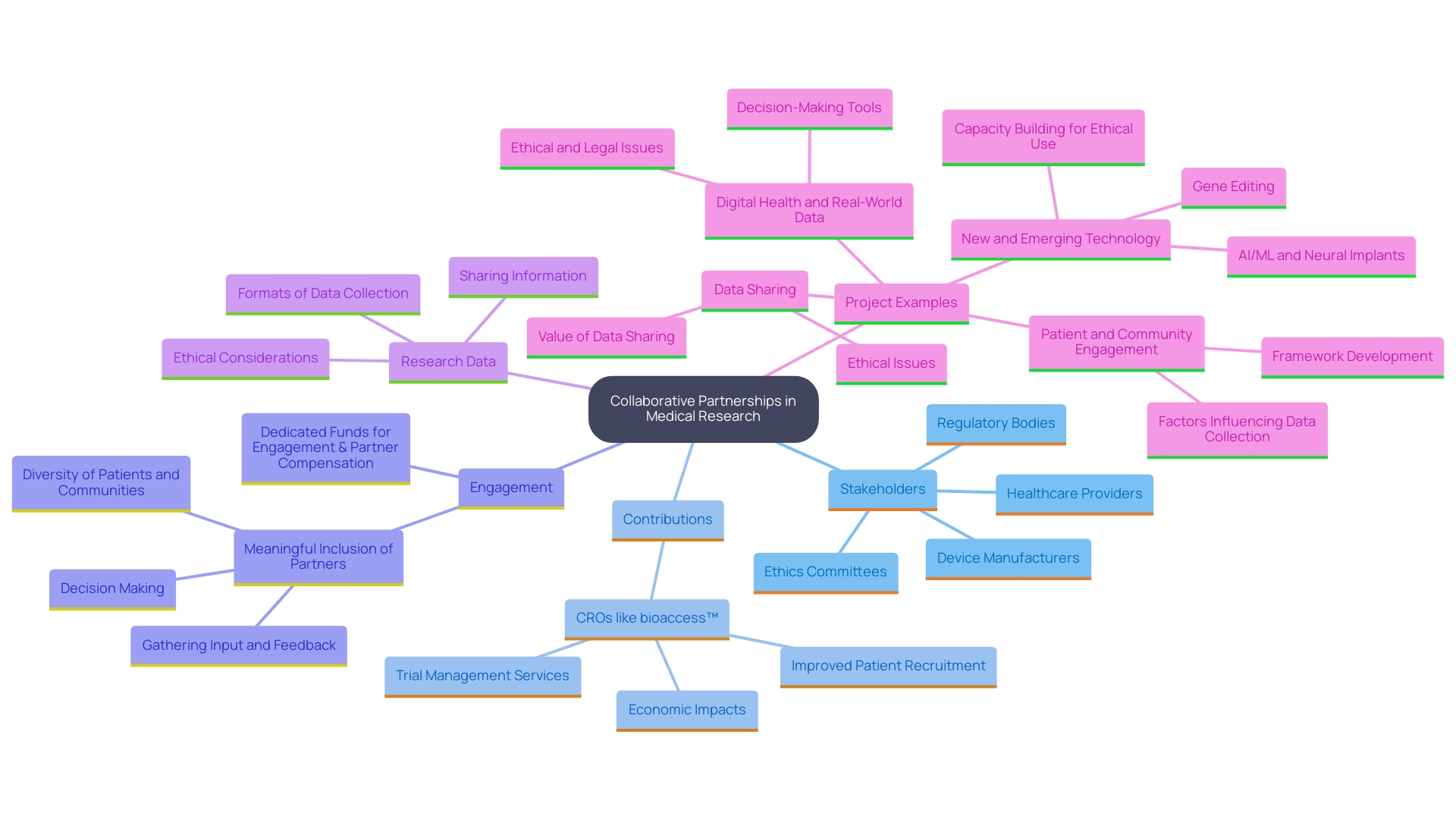
Future Trends in Clinical Research and CRO Operations
The terrain of medical research is constantly changing, shaped by innovations in technology and alterations in governance frameworks, especially in Latin America. Medtech companies encounter significant challenges, such as:
- Regulatory hurdles
- Limited financial resources
- The need for effective collaboration with local entities
The recent collaboration between Greenlight Guru and bioaccess™ seeks to close these gaps, speeding up Medtech advancements and studies, highlighted by PAVmed's successful first-in-human research in South America. Future trends for CROs in Colombia may include the integration of digital health technologies, such as telemedicine and remote monitoring, enhancing patient engagement and data collection processes.
Moreover, the increasing focus on personalized medicine is expected to influence the structure and implementation of research studies, necessitating CROs to modify their strategies accordingly. As the demand for rapid clinical trials increases, CROs will need to streamline their operations further, leveraging data analytics and artificial intelligence to improve efficiency and decision-making in research management.
Moreover, understanding the role of INVIMA, Colombia's National Food and Drug Surveillance Institute, is crucial, as it oversees medical device regulation and supports compliance with health standards, classified as a Level 4 health authority by PAHO/WHO.
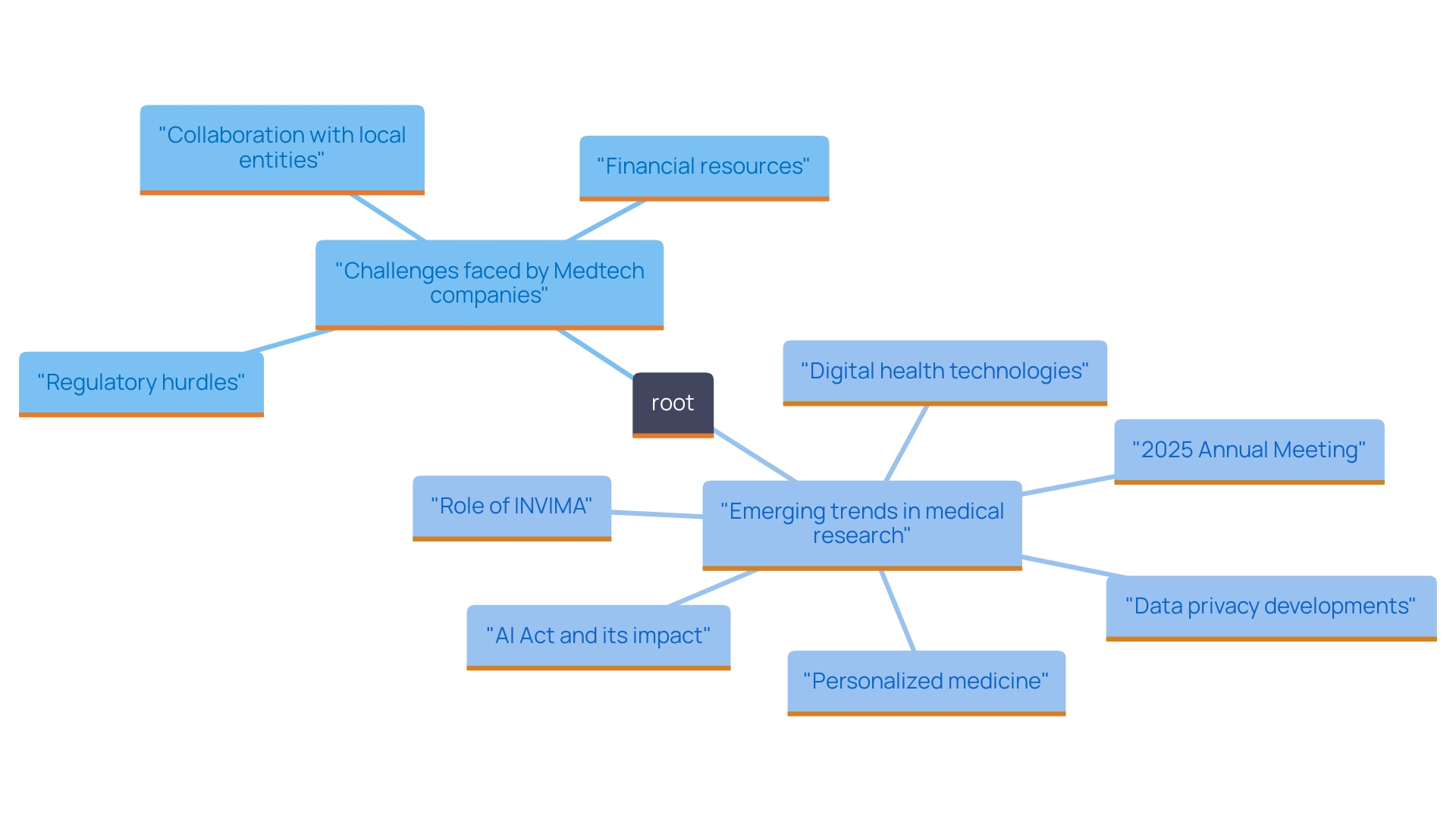
Conclusion
The pivotal role of Contract Research Organizations (CROs) in medical device trials cannot be overstated, particularly in the context of Colombia. By effectively managing clinical research projects and ensuring compliance with regulatory standards, CROs facilitate a smoother path for manufacturers to navigate the complexities of clinical trials. The advantages of conducting trials in Colombia, including cost savings and a robust healthcare system, highlight the country as a prime location for innovative medical technologies.
Colombia's supportive regulatory environment, characterized by efficient oversight from INVIMA and a commitment to fostering innovation, further enhances its attractiveness for clinical research. The positive feedback from industry leaders underscores the benefits of selecting Colombia for first-in-human trials, where the combination of speed, quality, and economic efficiency creates a favorable landscape for stakeholders.
Moreover, the importance of compliance and quality assurance in clinical trials ensures not only participant safety but also the credibility of research findings. Collaborative partnerships among stakeholders, facilitated by CROs, are essential in driving successful clinical research outcomes. As the field of clinical research evolves, the integration of new technologies and a focus on personalized medicine will shape the future operations of CROs, positioning them as key players in advancing medical device innovations.
In conclusion, the synergy between CROs and the Colombian healthcare environment presents a compelling case for conducting medical device trials in the region. As the demand for innovative solutions in healthcare continues to rise, leveraging the strengths of CROs in Colombia will be crucial for manufacturers aiming to bring their products to market efficiently and effectively.




